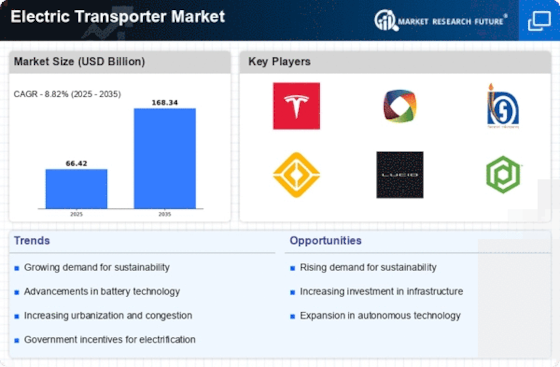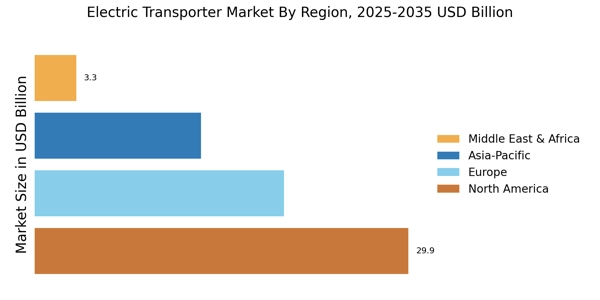Technological Innovations
Technological innovations are a driving force behind the evolution of the Electric Transporter Market. Advancements in battery technology, such as the development of solid-state batteries, are enhancing the performance and range of electric transporters. These innovations are crucial as they address one of the primary concerns of potential buyers: range anxiety. In 2025, it is anticipated that improvements in battery efficiency will allow electric transporters to achieve ranges exceeding 400 miles on a single charge. Furthermore, the integration of smart technologies, such as autonomous driving features and connected vehicle systems, is likely to attract a broader consumer base, thereby propelling growth in the Electric Transporter Market.
Rising Environmental Concerns
Rising environmental concerns are increasingly influencing consumer behavior and preferences within the Electric Transporter Market. As awareness of climate change and air pollution grows, consumers are more inclined to seek eco-friendly transportation options. This shift in consumer sentiment is reflected in market data, which indicates that electric transporters are projected to capture a larger share of the overall vehicle market. In 2025, the Electric Transporter Market is expected to witness a compound annual growth rate of approximately 15%, driven by the demand for cleaner alternatives. Consequently, manufacturers are focusing on producing electric transporters that not only meet regulatory standards but also align with the values of environmentally conscious consumers.
Government Initiatives and Incentives
Government initiatives and incentives play a pivotal role in shaping the Electric Transporter Market. Various countries have implemented policies aimed at reducing carbon emissions and promoting sustainable transportation solutions. For instance, tax rebates, grants, and subsidies for electric vehicle purchases have been introduced, encouraging consumers to transition from traditional vehicles to electric transporters. In 2025, it is estimated that government incentives could account for up to 30% of the total sales in the Electric Transporter Market. These initiatives not only stimulate demand but also foster innovation within the industry, as manufacturers are incentivized to develop more efficient and cost-effective electric transport solutions.
Economic Factors and Cost Competitiveness
Economic factors and cost competitiveness are crucial elements influencing the Electric Transporter Market. As production costs for electric transporters decrease, driven by advancements in manufacturing processes and economies of scale, the price of electric vehicles is becoming more competitive with traditional internal combustion engine vehicles. In 2025, it is expected that the price parity between electric transporters and conventional vehicles will be achieved in several segments, making electric transporters more accessible to a broader audience. Additionally, fluctuating fuel prices and the rising cost of ownership associated with traditional vehicles further enhance the appeal of electric transporters. This economic shift is likely to accelerate the growth of the Electric Transporter Market.
Urbanization and Infrastructure Development
Urbanization and infrastructure development are significantly impacting the Electric Transporter Market. As urban areas expand, the demand for efficient and sustainable transportation solutions becomes more pronounced. Cities are increasingly investing in electric vehicle charging infrastructure, which is essential for supporting the growth of electric transporters. In 2025, it is projected that the number of public charging stations will increase by over 50%, facilitating greater adoption of electric transporters. This infrastructure development not only alleviates range anxiety but also encourages consumers to consider electric transporters as viable alternatives to conventional vehicles. Consequently, urbanization trends are likely to bolster the Electric Transporter Market.

















